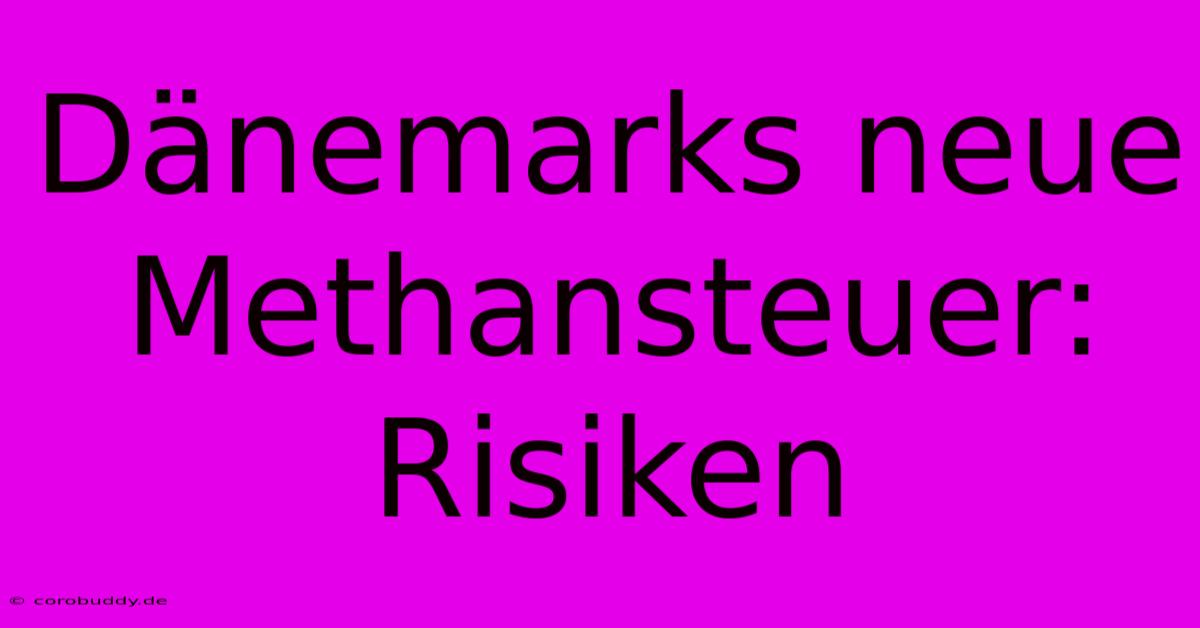Dänemarks Neue Methansteuer: Risiken

Discover more detailed and exciting information on our website. Click the link below to start your adventure: Visit Best Website Dänemarks Neue Methansteuer: Risiken. Don't miss out!
Table of Contents
Dänemarks neue Methansteuer: Risiken und Chancen für Landwirte und Unternehmen
Hallo zusammen! Let's talk about something that's been brewing (pun intended!) in Denmark: the new methane tax. It's a pretty big deal, especially for farmers and businesses involved in agriculture and related industries. Honestly, when I first heard about it, I was kinda freaking out. So much uncertainty! But after doing some digging, I’ve got a slightly clearer picture. Let's break down the risks and also – surprisingly – some potential opportunities.
Die Risiken im Detail: Was bedroht Landwirte und Unternehmen?
The main risk, obviously, is the increased cost of production. Methane is a byproduct of livestock farming, and this tax directly impacts farmers. Think about it: higher production costs inevitably mean higher prices for consumers. This could lead to a decrease in demand for Danish agricultural products, potentially hurting farmers' profits. It’s a real domino effect.
I remember talking to a dairy farmer a few weeks ago – a genuinely nice guy who’s been in the business for decades – and his face just fell when we talked about the tax. He’s worried sick about his future, and I don't blame him. He's already struggling with rising feed prices and labor costs. This tax feels like another blow. He’s not alone, either. Many farmers are facing similar challenges.
Furthermore, there’s the risk of reduced competitiveness. If Denmark imposes a significant methane tax while other countries don't, Danish goods might become less price-competitive on the international market. This could lead to job losses and a decline in the agricultural sector. It's a serious situation that needs careful consideration.
Businesses relying on agricultural inputs will also feel the pinch. Think food processors, fertilizer companies, and so on. The increased costs will trickle down, impacting their profitability and potentially leading to price hikes for consumers. It's a complex web of interconnected industries.
Chancen und Strategien zur Minderung der Risiken
But hold on, it’s not all doom and gloom. There are some potential opportunities hidden within this challenge. The tax could incentivize innovation and investment in sustainable practices. This could lead to the development of new technologies and methods to reduce methane emissions from livestock farming.
For example, there's been a lot of talk about feed additives that could reduce methane production in cows. It's still early days, but research in this area is promising. Think of it as a forced, albeit expensive, push towards greener farming practices – perhaps leading to long-term environmental benefits and a more sustainable agricultural sector.
Moreover, this could be a chance for Denmark to become a global leader in sustainable agriculture. By investing in research and development, and by supporting farmers in adopting new technologies, Denmark could position itself as a pioneer in this area. This could attract international investment and create new business opportunities.
What can farmers and businesses do? Firstly, thorough financial planning is crucial. Analyze your production costs carefully and explore ways to reduce your methane footprint. Secondly, stay informed about government support programs and incentives that might be available. Thirdly, collaborate! Working together with other farmers and businesses can help share resources, knowledge, and reduce the individual burden.
In short, Dänemarks neue Methansteuer presents significant risks, but it also creates opportunities for innovation and sustainable development. It's a complex issue that needs careful navigation, but with proactive strategies and collaboration, the agricultural sector can adapt and even thrive in this new environment. Fingers crossed!

Thank you for visiting our website wich cover about Dänemarks Neue Methansteuer: Risiken. We hope the information provided has been useful to you. Feel free to contact us if you have any questions or need further assistance. See you next time and dont miss to bookmark.
Featured Posts
-
Djokovic Neue Hublot Uhr In Paris
Nov 23, 2024
-
Drake Lamar Mit Neuem Angriff
Nov 23, 2024
-
Libanon Krise Gespraech Mit Experten
Nov 23, 2024
-
Vf B Stuttgart Bochum Bundesliga Heute Live
Nov 23, 2024
-
Spanien Rekordstrafe Fuer Airlines
Nov 23, 2024
